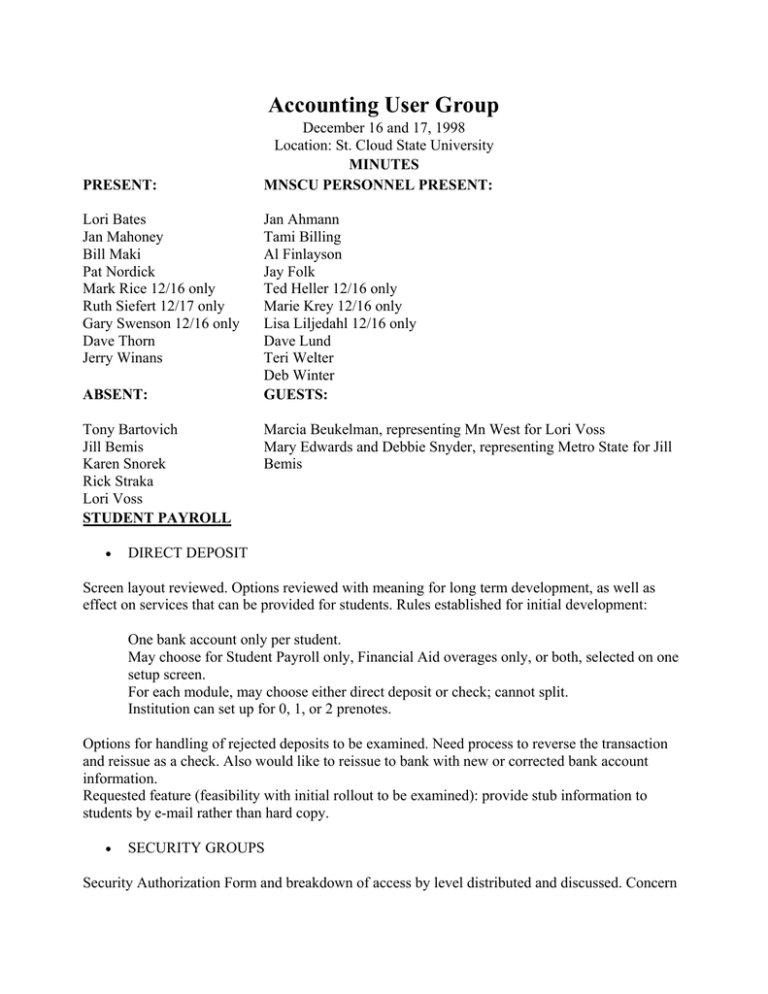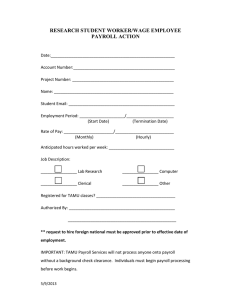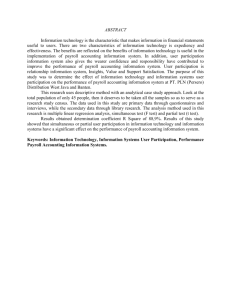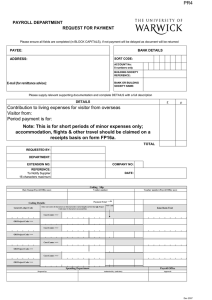Accounting User Group
advertisement

Accounting User Group PRESENT: Lori Bates Jan Mahoney Bill Maki Pat Nordick Mark Rice 12/16 only Ruth Siefert 12/17 only Gary Swenson 12/16 only Dave Thorn Jerry Winans ABSENT: Tony Bartovich Jill Bemis Karen Snorek Rick Straka Lori Voss STUDENT PAYROLL • December 16 and 17, 1998 Location: St. Cloud State University MINUTES MNSCU PERSONNEL PRESENT: Jan Ahmann Tami Billing Al Finlayson Jay Folk Ted Heller 12/16 only Marie Krey 12/16 only Lisa Liljedahl 12/16 only Dave Lund Teri Welter Deb Winter GUESTS: Marcia Beukelman, representing Mn West for Lori Voss Mary Edwards and Debbie Snyder, representing Metro State for Jill Bemis DIRECT DEPOSIT Screen layout reviewed. Options reviewed with meaning for long term development, as well as effect on services that can be provided for students. Rules established for initial development: One bank account only per student. May choose for Student Payroll only, Financial Aid overages only, or both, selected on one setup screen. For each module, may choose either direct deposit or check; cannot split. Institution can set up for 0, 1, or 2 prenotes. Options for handling of rejected deposits to be examined. Need process to reverse the transaction and reissue as a check. Also would like to reissue to bank with new or corrected bank account information. Requested feature (feasibility with initial rollout to be examined): provide stub information to students by e-mail rather than hard copy. • SECURITY GROUPS Security Authorization Form and breakdown of access by level distributed and discussed. Concern expressed that work authorization setup needs to be split from time sheet entry and balancing to maintain the separation between Human Resource and Payroll functions. Architects to pursue with Internal Audit. • PAYCODES Process defined and concept approved by group. Pay rates can be tied to a paycode set up by an institution, which would pay everyone assigned that paycode at the same rate. Changing the rate on the paycode would change the pay rate for everyone in that group at the same time. • W-2 FORMS Calendar year 1998 forms to be printed centrally as in the past. For calendar year 1999, information for all institutions will be contained on a system wide table that can be queried at a campus. A single W-2 form will be mailed for work at all campuses. Initial printing and mailing will be done centrally, and it is planned that reprints will be printed at the campus. • MISC. Discussion and definition of student payroll cost transfers, to change source of funding as additional funds become available. All potential changes and effects (FICA charges?) to be examined. Must be within fiscal year, which creates an issue with summer session transactions, and the award year assigned to the session. Request reiterated to have Student Payroll work authorization be created from the Financial Aid workstudy award. Enhancement item: request for new report or warning to indicate that Student Payroll is issuing payment to a student with an outstanding Accounts Receivable balance. OBJECT CODE TABLE CHANGES Changes for Fiscal Year 2000 were reviewed. Changes needed based on discussion were recorded, with the document to be updated by the system office, and redistributed at the next User Group meeting, with the intention of wide distribution at the regional accounting meetings. ACCOUNTS RECEIVABLE • FUNDS APPLIED New funds applied process to be installed for Spring Semester, in order to support 3rd Party payments and billing. January 6, 1999 determined to be cutoff between old and new processes. Because of differences in the processes, a clean break is needed between Fall and Spring semesters for this year only. Prior term charges and non-term charges entered prior to January 6th, will not be considered in the application of funds. Proper table setup of dates and awards is critical. The refund process will be changed. If new aid is applied resulting in an overpayment situation, a check will automatically be produced the next time A/R checks are processed. If the amount of funds applied is less than had been previously applied, the overage will be considered a refund, and will appear on a refund screen to be authorized for a check to be produced. If credit card payments have been received, it will be noted, allowing for refund through credit card. Prepayments will be processed differently in the new version. Whereas prepayments with a term currently will apply only to that term’s charges, beginning with Spring, a prepayment with a term designation will pay current term, prior term, and non-term charges, beginning with the start of the term as identified in date type 30. Non-term prepayments will apply to any charges. Funds applied should release type 31 holds. Review of hold process, and release to campuses should be pursued. Need cashiers to be able to release holds immediately. • NEGATIVE RECEIPTS – INTERNAL CONTROL ISSUE The current system allowing cashiers to enter negative receipts, particularly to closed cash sessions, creates the ability to conceal the theft of cash. Negative receipts serve a legitimate business practice, but greater care is required to prevent improper use. Suggested enhancements: Modify security to prevent cashiers from correcting any receipt that is not in their current cash session. A new security group would allow these corrections. Provide a report showing all negative receipts, with original and corrected receipt, and a required comment to be completed with each correction. This report should be reviewed by someone independent of the cashiering function. • SLIP PRINTER CHANGES Samples of a revised slip printer receipt were reviewed. Overall widely accepted; developer returned with minor changes, such as adding customer name to receipt, and dollar amount to endorsement. Release anticipated in near future. • COURSE FEE ALTERNATIVE A problem has been identified, where a course fee paid once should cover student liability for multiple courses. The maximum fees table (AR_INST_MAX) needs to be modified to allow such a fee to be charged only once if a student is enrolled in multiple courses. COST ALLOCATION / CONSUMABLE INVENTORY SYSTEM Basic model and business functions of the proposed Cost Allocation and Consumable Inventory systems were distributed, discussed, and approved. Committee approved use of ‘Average Costing’ for determination of charge rates. Methods of charging overhead were discussed. Users would like option of charging overhead at the fund level, on an item by item basis, or at the job level. Users should be able to set or override overhead charges at the point of charging any particular job. It is anticipated that the Cost Allocation system will move cash with in a fund, and create Due From – Due To transactions for purchases between funds. The audit guide will be reviewed for business rules regarding classification of payments as income or expenditure refunds. Additional function of ‘remote ordering’, or the ability of departments to place orders directly into the system, was requested. To Do Items. Create specs and continue development of Direct Deposit system – architects and developers. Examination of Direct Deposit transaction cancel and reissue option – architects. Discussion with Internal Audit regarding Student Payroll Security groups, and separation of Human Resource and Payroll functions – architects. Examination of potential changes and effects of student payroll cost transfers – architects. Functional spec needed for the Student Payroll work authorization to be created from the Financial Aid workstudy authorization – architects. Update Object Code Table with agreed upon revisions – system office. Completion and implementation of Funds Applied revisions – developers and architects. Funds Applied to release type 31 holds, and review status of holds process. Modify security to prevent cashiers from correcting any receipt that is not in their current cash session. Create a report to show all negative receipts, and information to allow audit of this activity. Completion and implementation of Slip Printer receipt and endorsement changes – developer. Modify maximum fees table to allow a course fee to be charged only once for multiple courses. Complete formal functional specs and pursue development of Cost Allocation / Consumable Inventory system – architects and developers. Next Meeting: February 10th and 11th, 1999 (these are the revised dates), in St. Cloud Recorded by: Teri Welter and Dave Lund


